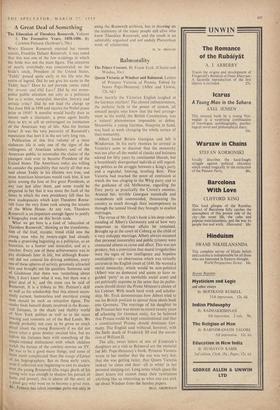Balmorality
How heartily the Victorian English laughed at the German intellect! The absurd industriousness, the pathetic faith in the power of system, all amused people who knew that the best arrange- ment in the world, the British Constitution, was a natural phenomenon impossible to define. Meanwhile a young German, blueprint in hand, was hard at work changing the whole nature of their monarchy.
Albert found Britain Georgian and left it Windsorian. In his early twenties he arrived in Victoria's arms to discover that the monarchy was not after all the model of checks and balances adored for fifty years by continental liberals, but a breathlessly disorganised indivickal still regard!. ing politics as the struggle between a King's party and a regicidal, limiting, levelling Rest. Poor Victoria had reached the point of confusion at which she was clinging to the Whig party and to the guidance of old Melbourne, regarding the Tory party as practically the Crown's enemies. Around her, terrible Georgian numskulls and roustabouts still commanded, threatening the country as much through their incompetence, as through the tainted blood they brought to exalted marriages.
The virtue of Mr..Eyck's book is his deep under- standing of Albert's Germanity and of how very important in German affairs he remained. Brought up at the court of Coburg as the child, of a very unhappy marriage, Albert always assumed that personal immorality and public tyranny were connected almost as cause and effect. This was not Prudery, but a conviction that moral irregularities were the signs of low intelligence and hopeless unreliability—an observation which was virtually accurate in the English court of 1840. He wanted a moral monarchy, which would be nOn-political (Albert was no democrat and seems to have re- garded `party' as an inevitable social acne) and yet politically supreme in the sense that its prefer- ences should direct the Prime Minister's choice of his Cabinet. With much hard work and scholar- ship, Mr. Eyck demonstrates how Albert tried to
his British . . . . . . . back use his British position to spread these ideals bacK into Germany. The marriage of his daughter to the Prussian heir was meant to crown twenty years of scheming for German unity, for he believed that Prussia could be kept constitutional and that a constitutional Prussia should dominate Ger- many. The English seed withered, however, with the futile death of Frederick III and the succes- sion of William II.
The silly, sweet letters of one of Frederick's daughters on a visit to Balmoral are the material for Mr. Pope-Hennessy's book. Princess Victoria wrote to her mother that the sun was very hot, that she was getting fatter, that Queen Victoria looked 'so clean and dear—all in white' in her personal sleeping-car. Long notes which space the short letters out cannot make their revelations anything like as interesting as what one can pick up about Windsor from the Sunday papers.
NEAL ASCHeRSON






































 Previous page
Previous page